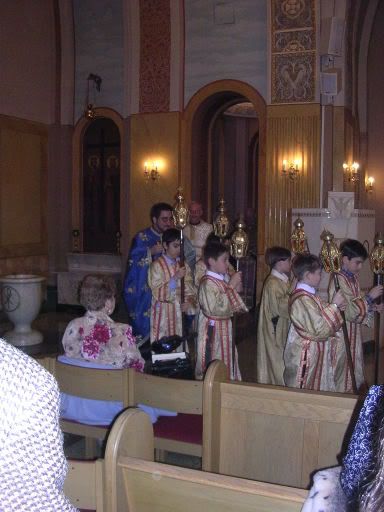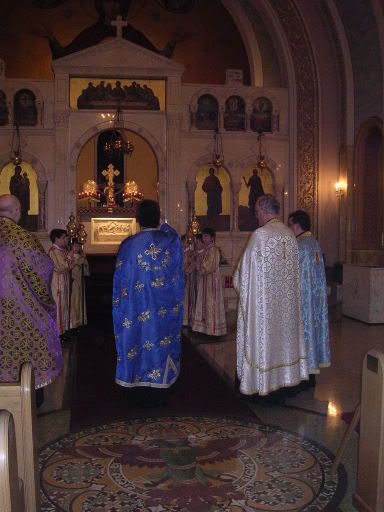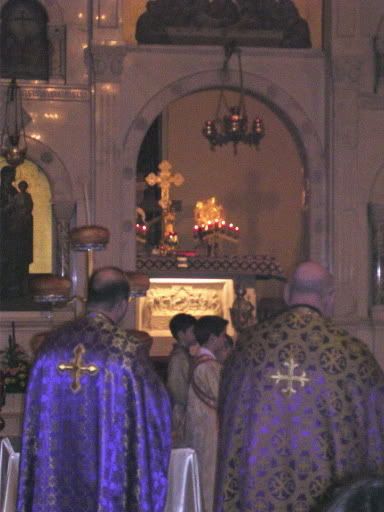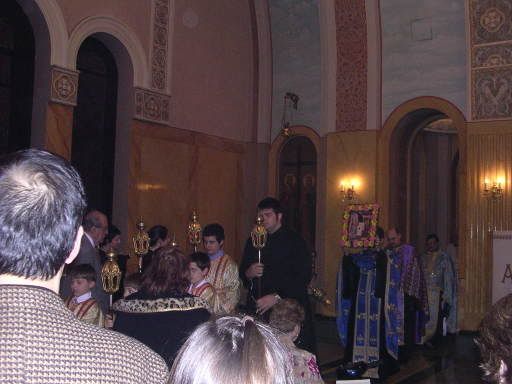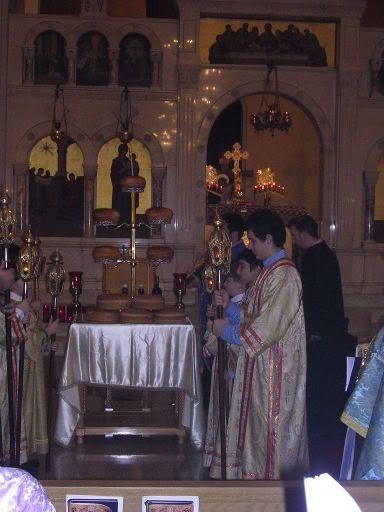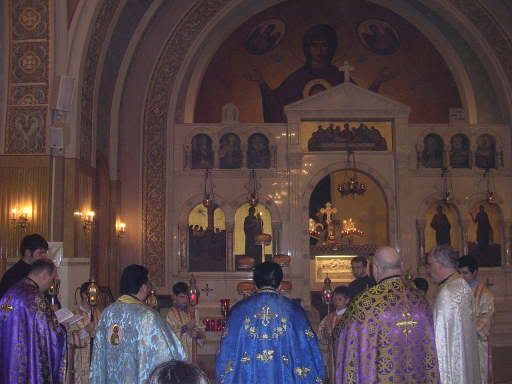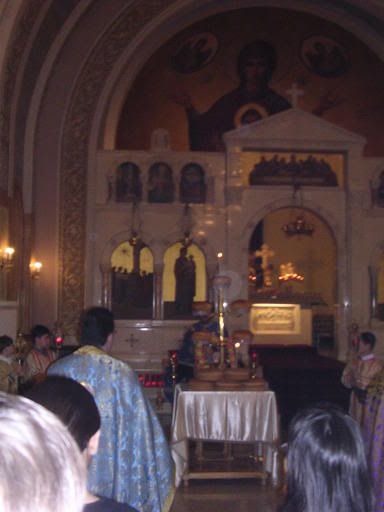President George W. Bush Welcomes Archbishop Demetrios and the Greek American Community to the White House on the Occasion of Greek Independence Day 2006
Address of His Eminence Archbishop Demetrios of America and Remarks of the President of the United States Mr. George W. Bush on the Occasion of the Proclamation For Greek Independence Day
March 24, 2006
Dwight D. Eisenhower Executive Office Building
Washington, D.C.
Mr. President,
For the sixth consecutive year we have the distinct honor and special privilege to be your hosts at the White House on the occasion of the celebration of Greek Independence Day. As Greek-American Orthodox community, we are deeply grateful for such a great honor and for your exceptional kindness to sign this pertinent document of proclamation, a proclamation that pays tribute to the historic day of March 25, 1821, which is a symbolic day of the Greek War of Independence, or Greek Revolution, that ended with the liberation of Greece after four bitter centuries under the painful occupation and rule of the Ottoman Empire.
The remarkable issue here is that the Greek Revolution was not an isolated event or a rare phenomenon. Throughout her exceedingly long history of at least 4,000 years before Christ and another 2,000 years after Christ, the nation of Hellenes has been constantly involved in revolutions, battles, and fights for preserving independence and freedom and, when lost, for regaining these precious ideals.
For serious students of history, the mere survival, Mr. President, of the Hellenic nation is a miracle indeed. Greece has always been a nation with a small population, located in a very important geopolitical area which has been a permanent passageway for people and a battleground for armies, not simply for years or centuries, but for millennia. Yet, while numerous other national entities have simply disappeared, the Greek nation has survived the cruelest and longest tests in history. How and why? Is there a secret to this survival? Is there an explanation for it? Probably yes! And this is the fact that the Greek nation has always been absolutely conscious of having a mission in this world, a mission of serving the highest possible ideals and sharing them with every nation, friend and enemy alike. This awareness and condition of mission explains not only the mere survival but the Greek nation’s brilliant, most generous universal contributions to the ideals of freedom, human dignity, and democracy. This explains its amazing creativity in the fields of science, philosophy, literature, arts, considered classic and unsurpassed, and additionally, its astonishing contribution to theology and religion after the synthesis of Hellenism with Orthodox Christianity during the late Hellenistic and Byzantine era.
So then, the celebration of Greek Independence Day is not a celebration of a historically limited event, but of a unique, diachronic, and universal achievement by the Greek nation in “whatever is true, whatever is just, whatever is pure, whatever is lovely, whatever is gracious, whatever belongs to excellence, whatever belongs to virtue, whatever is worthy of praise,” to use the language of St. Paul from his letter to the Philippians (Phil. 4:8), the Greek people of the city of Philippi in Greece.
In the center of all this is a passion for freedom and independence, for justice and peaceful coexistence, the most precious gifts of God. From such a perspective America, here, is the place for a very appropriate celebration of these unique gifts. We give the warmest thanks to God for living in this beloved country, the United States of America, which exemplifies in the most clear way the superb classic achievements that we have mentioned. Here, in America, we do not celebrate occasionally these great achievements. Rather, here, we feel daily the universal demand for freedom; we constantly experience the need for justice for all; we incessantly breathe the air of true democracy; and we deeply share the pain of all those who look for reconciliation and peace on earth.
We are aware Mr. President of your commitment to these great ideals of the universal Hellenic heritage, and we are also aware of the complex and formidable problems that you face in translating the noble principles of freedom and democracy, justice and peace, into a palpable reality. Please be assured that you have our wholehearted prayers in your exceedingly delicate handling of all such relevant issues, and the expression of our faith that with the help of the Almighty God, present and future difficulties will be overcome, and freedom, democracy and peace for all will finally prevail, Mr. President. Thank You.
Remarks of President Bush
Thank you. Welcome. Your Eminence, thank you for your kind words. You’re a philosopher, you’re a wise person, you’re an incredibly compassionate soul, and I’m proud to call you “friend.” Thank you for being here.
Thank you for inviting me to help celebrate the 185th Anniversary of Greek Independence. America is a better country because of Greek Americans. It’s something about the passion, the verve for life, the willingness to serve. I am blessed by having Greek Americans in my administration, two of the most important of whom have joined us, Your Eminence: John Negroponte, the Director of the National Intelligence and the Homeland Security Advisor, Frances Fragos Townsend.
Madame Foreign Minister, we are thrilled to have you here. Thank you for coming. Let me just say this, that it is a wise government who relies upon the judgment and advice of a woman as a Foreign Minister or Secretary of State. And I look forward to sharing our visit with my mother and dad who are close to the Minister. And I know they’re going to be thrilled to know that you’re strong and optimistic in serving your great country with class and dignity.
Mr. Ambassador, thank you, as well. Appreciate — good to see you, sir. I appreciate Christos Folias, who is the Deputy Minister of Economy for Greece. Welcome, sir. It’s good to see you.
I am really pleased that Senator Paul Sarbanes is with us today. He has served with great distinction in the United States Senate. He has decided to move on to other ventures, and the state of Maryland will miss his leadership. I’m proud you’re here, sir.
I want to thank those who wear the nation’s uniform. Your Eminence, as you know, ours is a remarkable country, where people are willing to volunteer to serve our country in times of war. And our nation is blessed to have men and women who, in the face of danger, say, I want to help. So thanks for coming. More importantly, thanks for serving. I know you share the same feeling I share that it is an honor to serve the United States of America.
I want to thank the other Greek Americans, leaders and folks who are here. Thanks for coming. Thanks for traveling long distances to be here in Washington.
We honor Greek Independence Day because of the values we share. That’s why it’s a comfortable event. That’s why it’s an important event, Your Eminence. The ancient Athenians gave birth to democracy. They entrusted their citizens with the power to govern. That’s a powerful concept. It wasn’t always that way. In some parts of the world, it still isn’t that way. But, nevertheless, it is a universal concept, started by the Athenians.
We respect the philosophy that grew out of Greece that honored and respected human dignity and human rights, and, as you said, Your Eminence, the belief that there is universality to the concept of liberty. Freedom is not confined to Greece, nor is it confined to America. It is universal in its application, and that’s one of the great lessons of Greek Independence Day.
America’s founding fathers were inspired by the democratic ideals, and it helped to form our own union. Those ideals became implanted in long-lasting documents. But as we watch the world today, we must understand that democracy is difficult at times. It’s not easy to take hold. It requires work and diligence and optimism and strength and will. But the Greek lesson not only in Greece, but also here in America, is one that with time and persistence, liberty does take hold because of its universality. It’s a lesson we honor on Greek Independence Day.
When the founders of modern Greece claimed their freedom in 1821, they had the strong backing of America. The American people supported that independence: John Adams, Thomas Jefferson, James Madison, all members of the ex-Presidents Club I’m not there yet, Your Eminence. All urged support of the Greek cause.
Young Americans volunteered to serve in the new Greek army. Many more Americans contributed funds to support the Greek people in their struggle for freedom. America stood side-by-side with those who struggled for liberty in 1821.
It’s reminiscent of what’s taking place in the 21st century. Our two nations have continued to work together in freedom’s cause. Greece was an ally of the United States in major international conflicts of the 20th century. We’re allies in the war on terror. In Afghanistan, Greece is a valuable contributor to the NATO-led International Security Assistance Force. And we thank your government for that. Greece provides security at the Kabul International Airport, and we thank your government for that, as well.
Greece has also been generous in the support for the Afghan people, and the Afghan people thank the Greek government for that, as well. Last month in London, for example, Greece pledged funds to support educational programs. The Greek government decided to support entrepreneurship with the full knowledge that education and entrepreneurship can lead to a prosperous and thriving economy so that the people can see the benefits of liberty.
Greece is supporting other efforts in the war on terror. Our two nations remain committed to the security and counterterrorism partnership we put in place during the Olympics in Athens in 2004. By the way, people still marvel at how well those Olympics were run. The government stood up — and in spite of all the criticism that was taking place — put on some great games. It’s a model for other countries to follow.
Greece and the United States are working together to keep our people safe. We’ll continue to work together to spread the blessings of liberty because we understand that when we spread the blessings of liberty, it lays the foundation for peace. And that’s what we want.
At home Greek Americans strengthen our communities. Greek entrepreneurs contribute to our country’s prosperity. The Greek culture enriches our entire country. The Greek Orthodox Church reflects America’s religious diversity. It’s a source of strength and unity and inspiration for many Greek Americans.
I also understand that Greek Independence Day is the Feast of the Annunciation in the Orthodox faith, that they’re celebrated together because they both represent good news. On Greek Independence Day, Greeks and Americans honor the anniversary of the Greek call for independence and celebrate the universal good news of freedom and liberty. We believe that freedom is God’s gift to all people. And we know that by working together, freedom is on the march.
Your Eminence, thank you for inviting me. May God bless you all.
Greek Independence Day: A National Day of Celebration of Greek and American Democracy, 2006 – A Proclamation by the President of the United States of America




